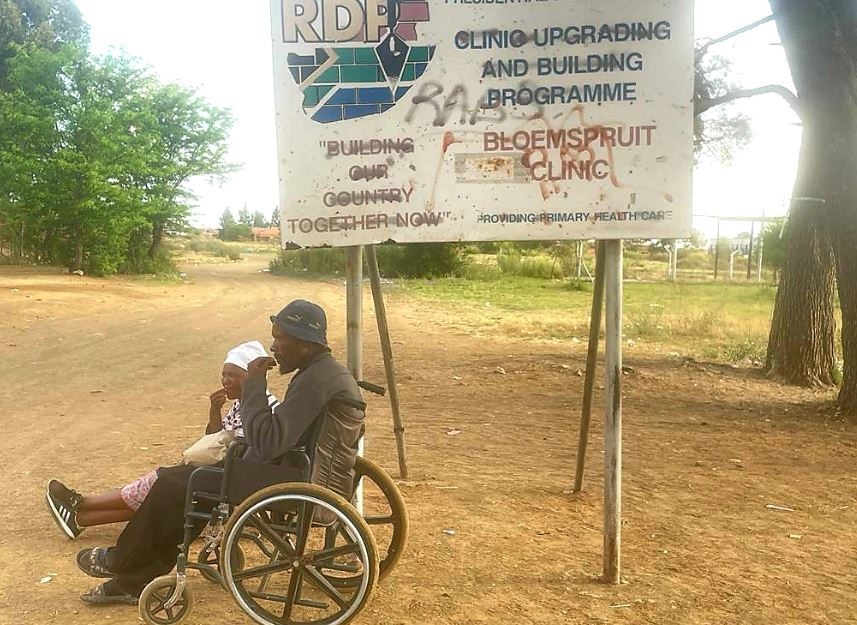
A recently published report by the community-led clinic monitoring project, Ritshidze, shows there have been pockets of improvements at some clinics in the Free State, but there are key issues on which facilities' performance has worsened, especially for people living with HIV. Refilwe Mochoari unpacks the report's findings, zooming in on the situation at Bloemspruit Clinic in Mangaung.
"Today, we were lucky they did not send us back home," says Makhothatso Mohomaile, 63, outside the Bloemspruit Clinic in Mangaung, where she is waiting on transport with her brother, Maila Kgoaribe, 53.
Kgoaribe is in a wheelchair and relies on his sister to get to and from the clinic. Most months, she fetches his chronic medication.
Mohomaile tells Spotlight her biggest challenge is the long waiting times.
"On collection days, I arrive here at 06:30. I live in Phase 10 (an informal settlement about 10km away from the clinic), so I leave my house at 04:30 and arrive [to] the clinic at 06:30. The clinic opens at 08:00 and I only get help at around 14:00," she says.
"They give me one month's supply of my brother's medication. Then, every three months, I have to bring my brother for blood tests. The blood test days are the worst because I need to find transport that will drive us to the clinic and that costs us R200 for a return trip. This means that sometimes we miss our date because we don't have money and, when we come to the clinic, the nurses shout and sometimes do not want to help us because we missed our date."
Mohomaile says it often takes longer when they have to do blood tests.
She says:
Her wish, she says, is for the health department to bring services closer to them.
"I leave my house very early and it is still dark at that time. Even when I am at the clinic, it is still not safe because I arrive here when the gates are still closed," she says.
Kgoaribe says he is grateful for his sister.
"I don't know how I was going to receive my medication and come to the clinic if she was not in my life. Today, we are grateful, though, because we received a supply for three months, so our next clinic date is in January," says Kgoaribe. "Still, I wish there was a clinic closer to home."
Small pockets of improvement
A recently published report on the state of health in the Free State suggests the siblings' experience is not unique. The community-led clinic monitoring project, Ritshidze, published its latest findings for the province on 29 September.
The report shows there have been pockets of improvements at some facilities, but there are key issues on which the performance of facilities has worsened, especially for people living with HIV.
The data was collected between July and August 2022 at 29 clinics and community healthcare facilities across the province, including one facility in Fezile Dabi District, 13 in Lejweleputswa, six in Mangaung Metro and nine in Thabo Mofutsanyana.
Monitors interviewed 29 facility managers, 1 349 public healthcare users (of which 71% were people living with HIV), and monitored 29 facilities.
READ | Eastern Cape health department unveils R29m upgraded mental health facility for teens
One of the clinics monitored is the Bloemspruit Clinic, situated on the Old Thaba Nchu Road, east of Bloemfontein.
The biggest challenge, according to patients, community members, health officials and opposition parties, is that the clinic serves too large a population and is not coping. Services at this clinic have not improved, but instead continue to deteriorate, they say.
The report also flags it as among the worst-performing facilities on waiting times, shortage of staff, bad staff attitudes and viral load literacy.
Viral load tests measure the amount of HIV in a person's blood. People living with HIV should get at least one viral load test per year and the results should be shared with them.
She shouts at us and tells us to sit until she calls us, but sometimes she never calls us in... when she is asked why she does that, she says she’s tired and wants to knock off. She tells us she will not give us medication & says we must buy it from the pharmacy #FreeStateHealth pic.twitter.com/6mrgwlzvon
— Ritshidze (@RitshidzeSA) September 29, 2022
Waiting times
Bloemspruit is among the clinics where waiting times were flagged as a concern last year, especially as it relates to filing systems. To improve waiting times, the report recommended that the provincial health department ensure that there is a functional filing system by October 2022. This year's report states the filing system has improved, which puts Bloemspruit among the four facilities that improved on this indicator.
Overall, 82% of public healthcare users interviewed across facilities indicated that waiting times are too long – 4% fewer than last year.
The most common reasons that public healthcare users cited for the long waiting times include that it takes too long to find files, the filing system is messy, and files are lost (60%). Other reasons cited include staff that are not working or working slowly (50%), and that there are not enough staff (40%).
Staff and staff attitudes
The report notes that the number of vacancies in the facilities monitored has almost doubled from 26 to 50.
At Bloemspruit, for example, the facility manager indicated they do not have enough staff, especially nurses and security staff. As was the case last year, staff attitudes at the clinic remained an issue.
"Only 41% of people thought that the staff members were always friendly and professional (down from 44% last year) and 56% of people said staff sent them to the back of the queue if they missed an appointment. The fear of poor treatment only discourages people from going back to the clinic," the report notes.
This can be especially harmful to the province's HIV programme.
The report states:
Bloemspruit is listed among the clinics where people living with HIV reported being sent to the back of the queue or being shouted at for missing an appointment. According to the report, some people reported being refused care if they did not have a transfer letter or their identity document.
Medicine stockouts
Among Ritshidze's recommendations on medicine stockouts, was that "there must be effective and immediate communication of stockouts between the National Department of Health and Free State Department of Health and to healthcare workers and patients" by October 2022. This, they say, did not happen.
Last year, 8% of patients reported having left facilities without the medicines they needed, and 20% of facilities (four sites) reported sending people home empty-handed when faced with a stockout/shortage of medicines.
This year, more patients (13%) indicated they had "left facilities without the medicines they needed, and 31% of facilities (nine sites) reported sending people home empty-handed when faced with a stockout/shortage of medicines". Among the most commonly reported shortages were for contraceptives and HIV medicines.
You will go in the morning & they’ll close while you’re still inside the clinic. You’ll sit there up until 4pm… then they will tell you to come back the following day. These are things that make us skip appointments. Thinking about spending the whole day there #FreeStateHealth pic.twitter.com/nhTRFfUIw5
— Ritshidze (@RitshidzeSA) September 29, 2022
Multi-month dispensing
In respect of giving people living with HIV more than a month's supply of medicines at a time, there was some improvement.
"Compared to the 7% of last year, 13% of people living with HIV received three or six months' supply of ARVs. Bloemspruit was among the top-performing facilities on this indicator.
"Unnecessary trips to the clinic just to collect an ARV refill add a burden on people living with HIV and to the already overwhelmed clinic and healthcare workers," the report reads.
Most people living with HIV who were surveyed (66%) said they would like to collect the ARVs closer to their homes, if it were possible.
On treatment literacy, however, more work is needed.
The report states:
High volumes of patients
EFF MPL Paulnita Marais is concerned about the situation at the Bloemspruit Clinic.
"The clinic does not have capacity to assist all these people and, as a result, the staff is not coping. As long as they do not get mobile clinics or build another clinic, this clinic will not be able to give quality health services. Each area must have its own clinic," she says.
Government responds
Mangaung's district manager for primary healthcare, Aron Malete, tells Spotlight the department's biggest challenge is that the number of people requiring healthcare services keeps increasing, while facilities remain the same.
"Just as in the case of Bloemspruit Clinic, the community is growing and the number of informal settlements that are not covered by health is increasing," he says.
He added:
Malete says the filing system in many facilities is failing because the registry is too small to accommodate an increasing population.
"At Bloemspruit, we are already in the process of bulk filing and it is improving," he says.
When asked why there was no electronic system in place for patient files, he says those are options that the department can consider, but will take too long to implement.
"We need a solution that we can work with right now because we are facing the challenges right now. In the long run, yes, we may have to look at the electronic filing system as it will help us in reducing the missing and misplacing of files at our clinics."
Maleta advises all healthcare users to make use of the complaint boxes at facilities to flag bad service and bad attitudes from staff.
"We apologise to the people who have experienced bad treatment at our facilities," he says, adding that staff often work in a high-pressure environment.
"But we have a campaign, called care of the carers, to ensure that our staff treat patients right. We have to push the care of the carers campaign. Through this campaign, healthcare workers receive psycho-social support," he says.
On improving waiting times, Maleta says they will improve the appointment system.
"We will no longer be booking too many people on one day because that defeats the whole objective of reducing pressure and ensuring that patients do not spend the whole day at the clinic," he says.
*This article was published by Spotlight – health journalism in the public interest.




 Publications
Publications
 Partners
Partners























